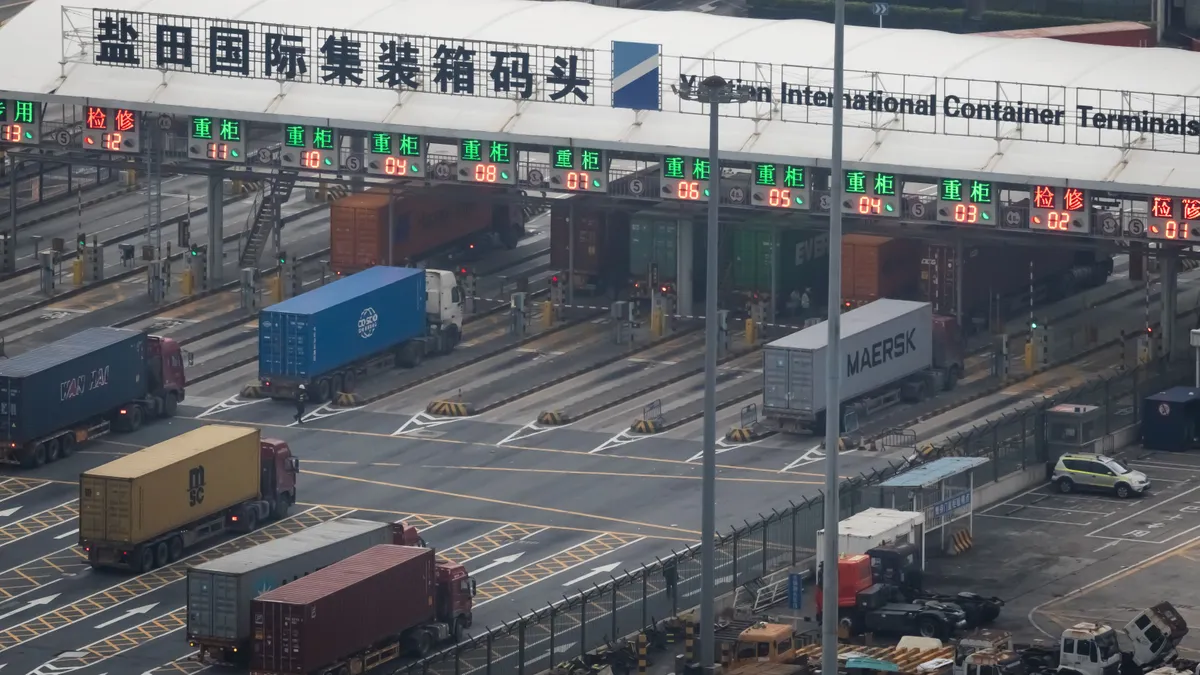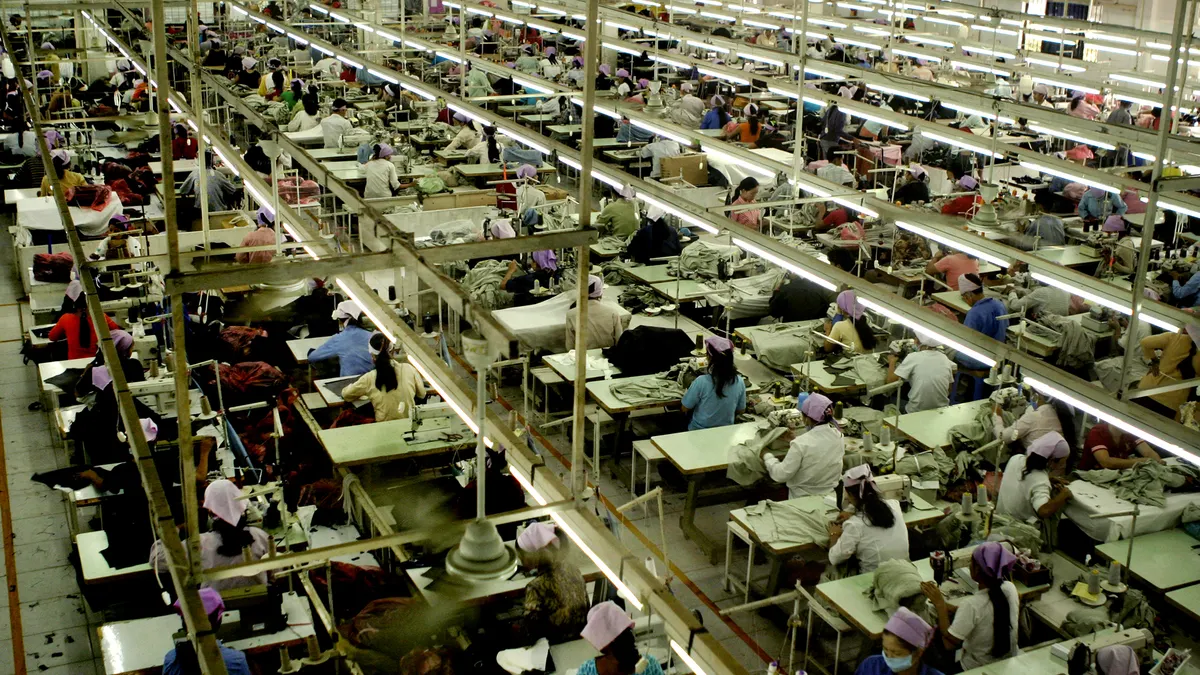Some companies that manufacture fast fashion goods in Asia may need to develop new strategies in order to accommodate U.S. consumer demand while also regulating prices.
The White House announced on April 4 that the U.S. de minimis exemption will no longer apply to products from China and Hong Kong as of May 2. Other countries also may be slated for de minimis elimination, although no additional details have been released.
The closure of the de minimis loophole means that imported goods sent “through means other than the international postal network that are valued at or under $800” will be subject to all applicable duties once the new policy begins, according to a fact sheet released by the White House.
Goods that are sent through the international postal network and that are valued at or under $800 will be subject to a duty rate of either 30% of their value or $25 per item, increasing to $50 per item after June 1, per the fact sheet. These duties are in lieu of any other duties, although the White House did not clarify how the duty rate would be applied.
Companies such as Shein and Temu have historically benefitted from the de minimis loophole, because their lower-priced products have allowed them to avoid duties incurred by more expensive brands.
A de minimis closure as part of the White House’s tariff rollouts has long been anticipated and began to take shape when the previous administration was still in office. In addition, as President Donald Trump shifts his international trade policies, there’s no way to predict what could change in regards to the de minimis closure in the coming weeks.
Already in motion
“All the brands we work with understood that [de minimis] was going away when Biden made the announcement,” Izzy Rosenzweig, CEO of logistics firm Portless, said in an email. He added that its elimination “is no shock to us, and we have been preparing for it.”
In the e-commerce logistics space, companies “are already hearing that the wheels are in motion” for fast fashion firms to begin shifting production, said Alison Layfield, director of product development at shipping services firm ePost Global, in an email.
Layfield said that supply chains for Shein, Temu and similar companies might move to regions outside China “that are not currently facing the same level of scrutiny.”
Layfield noted that while shifting supply chains outside China could help mitigate the immediate impact of the de minimis elimination, there would still be challenges.
“Shifting production requires coordinating with new suppliers, setting up production and navigating a host of logistical complexities,” Layfield said. “Even once the business transition is complete, there may be ongoing cost implications for product production. And, of course, there’s always the possibility that the U.S. government could eventually remove de minimis benefits for these alternative countries as well.”
Fashion customers pay the price
As companies navigate these challenges, consumers may end up paying the price, said Brian Ehrig, partner in the consumer practice of Kearney, a global consulting firm.
“Closing this loophole and requiring brands such as Shein and Temu to pay duties on imports will have a detrimental effect on sales for these brands because they will have no choice other than to significantly raise prices,” Ehrig said in an email.
It won’t only be the fast fashion brands that may raise prices, Layfield said.
“[Some retailers] have relied on the exemption to import smaller quantities of fast-moving inventory due to quick turnover of new trends while avoiding duties,” Layfield said. “Now, even inexpensive items will be subject to tariffs, leading to increased costs.”
Layfield added that for U.S. consumers, a de minimis closure could directly contribute to higher prices. “In order to absorb these new costs, these retailers may raise prices for their customers,” she said, adding that price hikes could make certain items less attractive to budget-conscious consumers.
Delays and other drawbacks
There also may be supply chain issues, at least in the short term, as companies scramble to navigate these new complexities.
“Companies like Shein and Temu, which thrive on fast, cost-effective turnaround times, will likely experience delays in shipping as they navigate new customs procedures for smaller shipments,” Layfield said. “This could slow down the rapid inventory turnover that they depend on.”
However, Rosenzweig of Portless said larger and more established international firms may be better-suited to handle these challenges.
“While removing [de minimis] will level the playing field for import tax, Shein and any company that uses the direct supply chain model still has major advantages like better cashflow and now tax deferment,” Rosenzweig said.
He added that the removal of de minimis duties might not even have a significant effect on some of the China-based companies the policy appears to target.
“Tariffs were never Shein’s primary advantage,” Rosenzweig said. “Their real advantage lies in tariff deferment and agile inventory management. Unlike traditional retailers who pay duties upfront, Shein and Temu only pay duties after the goods are sold. Consequently, higher tariffs give Shein and Temu a greater advantage.”
Rosenzweig said that this business model also applied to direct-to-consumer brands in the U.S. that have adopted a similar approach.
“[They will] continue to flourish, while traditional retailers will struggle financially,” Rosenzweig said. He added that removing de minimis tariffs “may level the playing field to some extent, but the underlying financial loophole remains wide open.”
Rosenzweig also noted that any company using a direct supply chain model “still has major advantages like better cashflow and now tax deferment.”
Benefits and outlook
The de minimis loophole closure could impact dupes in the fashion market.
Vidyuth Srinivasan, co-founder and CEO of luxury authentication platform Entrupy, said in an email this change could disrupt what he called “the shadow economy of counterfeit goods that often move through the same low-friction channels” as fast fashion items.
“Long term, it could force both legitimate and illegitimate players to reassess their logistics strategies,” Srinivasan said. “While some fast-fashion brands may localize distribution or adjust sourcing, counterfeiters — who’ve long taken advantage of low-declared values and minimal customs scrutiny — may look for alternate routes or new tactics.
“The loophole’s closure won’t eliminate counterfeiting, but it raises the cost of doing business for bad actors and adds a layer of friction to an otherwise seamless pipeline.”
Srinivasan cautioned that there are also possible drawbacks.
“One major risk is consumer pushback, especially when it comes to fast fashion,” Srinivasan said. “Higher prices and longer delivery times may drive shoppers away or toward alternatives like resale or domestic discount retailers.”
The domestic resale and recycle market may benefit not only from increased consumer interest, but also from a reduction in low-quality goods coming in from fast fashion brands, according to Rachel Kibbe, CEO of American Circular Textiles and Circular Services Group.
She said in an email that recyclers face specific challenges because some fast fashion garments are “made of unknown or mixed materials, with no transparency around chemical content or fiber composition — making safe, effective recycling nearly impossible.”
Kibbe said the de minimis exemption could support a more circular economy when it comes to secondhand goods and certain raw materials destined for U.S. manufacturers.
“We support keeping de minimus in place, or providing trade preferences for the resale market (i.e., buying a used handbag from Europe) and for the raw materials necessary to support ‘made in the USA’ fashion manufacturing,” she said.
However, Kibbe added that ending de minimis wouldn’t solve every problem. “We’d like to see smarter trade policy (plus incentives to onshore and nearshore) that distinguishes between products that support domestic and circular manufacturing, including reuse and recycling, and those that exploit the system to flood the U.S. with disposable, unregulated goods.”
Correction: This story has been updated to reflect American Circular Textiles' stance on the de minimis exemption.



















